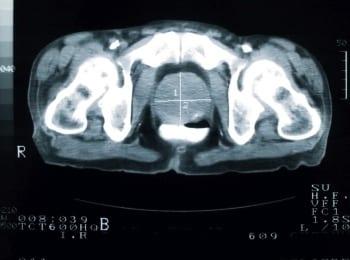
Prostate cancer affects more men than any other type of cancer — approximately one in six men will be diagnosed with it.
Although two-thirds of prostate cancers grow slowly and are largely asymptomatic, the remaining third of prostate cancers are aggressive and deadly, killing more men than any other cancer besides lung cancer. Prostate cancer is caused by the unchecked proliferation of cells in the prostate — the male gland that makes some of the fluids found in semen. The underlying cause of this cellular proliferation, however, is still not well understood.
Age and ethnicity are two of the most significant factors influencing a man’s risk of prostate cancer. Risk increases with age, and two-thirds of cases occur in men over the age of 65. In fact, 80% of men aged 80 or older have cancerous prostate cells. Ethnicity is another risk factor; the cancer is most common in men of African ancestry and least common in men of Asian ancestry, with individuals of European ancestry at intermediate risk. The high rate of prostate cancer in African Americans may not be totally attributable to ethnicity, however; African Americans have higher prostate cancer rates than Africans living in Africa, suggesting that diet or other non-genetic factors may also contribute.
In addition, genetics significantly contribute to prostate cancer risk. Twin studies suggest that heritability of prostate cancer is around 40%, making it one of the most heritable of cancers. The genetic aspect of prostate cancer is further underscored by the increased incidence observed in those with a family history; having a brother or father with prostate cancer doubles a man’s risk. Many studies have attempted to uncover the genes responsible for this genetic and familial risk, and when all the known associations are taken together, they explain approximately a quarter of the familial risk.

Screening for and managing prostate cancer is yet another big question mark. The widely-used PSA test, which measures levels of prostate-specific antigen, has recently come under fire as a screening and diagnostic tool for prostate cancer. Generally speaking, cancerous prostate cells produce more prostate-specific antigen than healthy prostate cells, but there is considerable variation between healthy individuals and many non-cancerous conditions can lead to increased prostate-specific antigens levels. A report by the U.S. Preventive Services Task Force argues that overdiagnosis resulting from PSA screening is actually doing more harm than good due to unnecessary surgeries and treatments that can have complications ranging from erectile dysfunction and incontinence to life-threatening blood clots and heart attacks. Because of this, the task force no longer recommends regular PSA screening, although not all physicians agree.
Given our current, limited understanding, prostate cancer is a paradox: it is arguably both one of the most deadly and one of the most benign cancers. Prostate cancer kills more men over the age of 75 than any other cancer, but the vast majority of cases are non-aggressive, slow-growing, and asymptomatic, to the point where doctors debate whether to screen for it. More research may help uncover more genetic and non-genetic factors that predict or distinguish different forms of prostate cancer or lead to better ways to screen effectively for this common disease.




